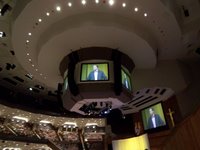I subscribe to the
Secular Student Alliances Newsletter. Their writings are concise and enlightening; a window into their world. Most important—it forces me out of my Christian backyard.
Secular Student Alliance
Mobilizing Students for a New Enlightenment…is an educational nonprofit organization whose purpose is to educate high school and college students around the country about the value of scientific reason and the intellectual basis of secularism in its atheistic and humanistic manifestations.
Statement on the Secular Student Alliance’s Evangelism and Discipleship EffortsTo any minimally astute observer of the freethought movement, it is apparent that our lack of numbers inhibits our ability to educate the public about atheism, free inquiry, critical thinking and scientific reasoning. The key to resolving this problem is building a strong youth and student movement. It's not enough though to involve students and then lose track of them when they graduate. The SSA is committed to finding solutions to this problem by developing programs to maintain involvement, communication and community. Pursuant to this effort, we wish to develop tight ties with local and national groups to assist us in this effort.
Here’s an example of what one of their writers identifies as a
Religious Attitude. And you know what? He's right.
Shame on us!Religious Attitude (part 1)A few days came and went and, seeing as I was still befuddled, I decided I would stop by the Christian group's weekly meeting. Since the food court was right by their meeting place, I decided to stop in after some Blimpie's. Hot pastrami, ham, and mozzarella in hand, I made my way into the meeting a few minutes early to talk to the guy and girl who seemed to be running the group.
I inquired, “Your group told me they were going to send a few representatives to a religion seminar we are holding, but it's come to my attention that you aren't planning on sending any. Is this true?”
“Yes,” they replied. “And it might be best if you just left too, please.”
”But why?” I asked.
Nothing.
“Can I stay for the Bible Study?”
A cold stare emanated from both of their eyes.
I left, bewildered that I was denied access to one of the highest-recruiting religious sects in the world, not to mention the largest one that is said to accept people with open arms. So much for that mantra.
I approached my friend about my rejection into the Bible Study and he said he wasn't aware that it had happened. I assured him that it had. While our conversation ended there, he hinted time and again, although he was perfectly fine with it, that perhaps my atheist status cast our symposium in a mocking light and that the group did not wish to associate with someone who demeaned their religion. I wrote a letter of apology to the group offering my sincerest regrets if I had somehow offended them and their religion by initiating this symposium with my religious status worn so obviously on my sleeve. I never received a response, and to this day I still do not know for sure why this group was so at odds with me.
Perhaps it was the sandwich….
Read the whole article...













